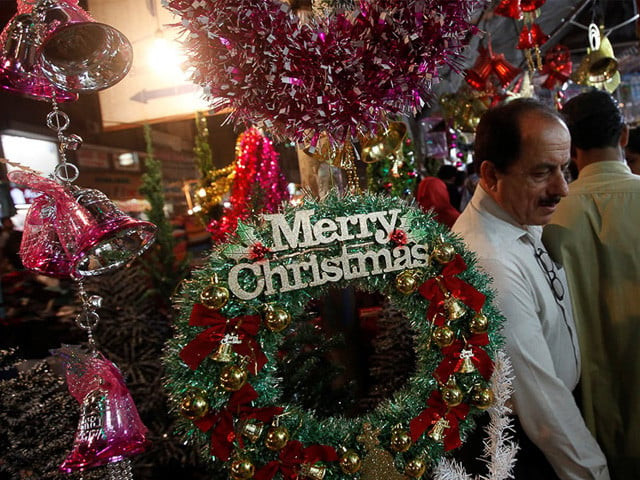For a lot of people, Christmas this year was the first one post-Covid and the various restrictions that came with it. While many people around the globe sent out Christmas wishes, there was a large section of Pakistanis who declared the celebration of Christmas as “haram” (forbidden). Many Pakistanis have termed this holy day for Christians as “shirk” since it signifies that Jesus is the son of God and saying “Merry Christmas” goes against Islamic values.
This isn’t the first time I’ve come across this argument. It’s been fairly common over the last few years from what I can recall. Not only do many people on social media adhere to this school of thought, but I’ve also seen my own friends and family do the same.
Things weren’t always this way though, and over here I’m strictly talking about my memory of growing up in Pakistan during the 1990s. I had friends in school who followed the Christian faith, and I do not recall anyone having an issue with wishing them a Merry Christmas. There was no effort to go out of the way and tell people how they were engaging in “shirk” by passing along a simple greeting. Obviously, this does not mean that Pakistan was a haven of secular thought and religious tolerance at the time, but simply that the poisoned pangs of bigotry had not sunk as deep in our veins back then.
It's not like something suddenly snapped in Pakistan following the 1990s. The seeds had been sowed much earlier, and they simply started bearing fruit later on – simple dupattas on the head turned into hijabs and burkas; mehndi functions started being equated with immodesty and vulgarity and the ‘dars’ culture became a whole new way of life. Music went from an everyday artistic expression to being outright haram. Movies weren’t spared either; neither were religious preachers who may have offered a less fundamentalist outlook.
While there is nothing wrong with turning towards a more religious way of life on a personal level, the issue becomes worrisome when it moves from being an entirely personal exercise, to being a conscious effort to implement and force the same on others.
The way an increasing amount of Muslim Pakistanis are now approaching Christmas is a subset of this whole problem. Truth be told, they haven’t even spared their own fellow Muslims from this approach either. Sunnis will go out of their way to accuse Shias of being heretics and Ahmadis are treated in a manner which would put most people of sound mind to shame. Islam as a religion is understood differently by different sects so there is no mutual agreement on the core principles of the religion among Muslims.
It is interesting to note, however, that the same people who have this modern-day attitude towards Christmas, are the same ones who are perfectly fine with receiving Eid wishes by non-Muslims. Watching international public figures belonging to other faiths wishing them for Muslim festivals is always welcomed. Furthermore, they have no qualms (and perhaps even expect) Christians in the community to greet them with the traditional ‘Salam’ as is common in all walks of life in Pakistan since they associate the ‘Salam’ with the Muslim faith. Interestingly though, the Salam is actually an Arab greeting that pre-dates Islam and is also common among non-Muslim Arab-speaking populations. The hypocrisy is blatant and almost comical.
To top it all off, the derogatory attitude and slurs the Christian community in Pakistan is subjected to is never-ending and outright unacceptable. These words and stereotypes are still common in our everyday vernacular, considered by most to be “harmless fun”. However, it is difficult to see the same people taking any stereotyping of their own Muslim faith as harmless fun.
Halloween and Valentine's Day are other events that receive criticism every year, despite the fact that neither have an actual theological link to the Christian faith, and are merely days that celebrate an event and provide an opportunity to have fun. The whole concept of engaging in light-hearted events and celebrations, however, is a concept that is becoming alien to the Pakistani population. There is always someone willing to sprinkle an element of ‘anti-Islamic’ and ‘anti-culture’ to these celebratory events, leading one to wonder how suffocating the discourse in Pakistan has become. Avenues of recreation are declining. Art is taking a beating. Music is largely becoming unacceptable. Movies, celebrated across the world, are banned in Pakistan.
Celebrating Christmas in Pakistan threatens religious values of many Muslim Pakistanis due to a simple greeting.
This is not the Pakistan I grew up in. Sadly, though, this is a Pakistan a lot of our kids will grow up in.



COMMENTS
Comments are moderated and generally will be posted if they are on-topic and not abusive.
For more information, please see our Comments FAQ